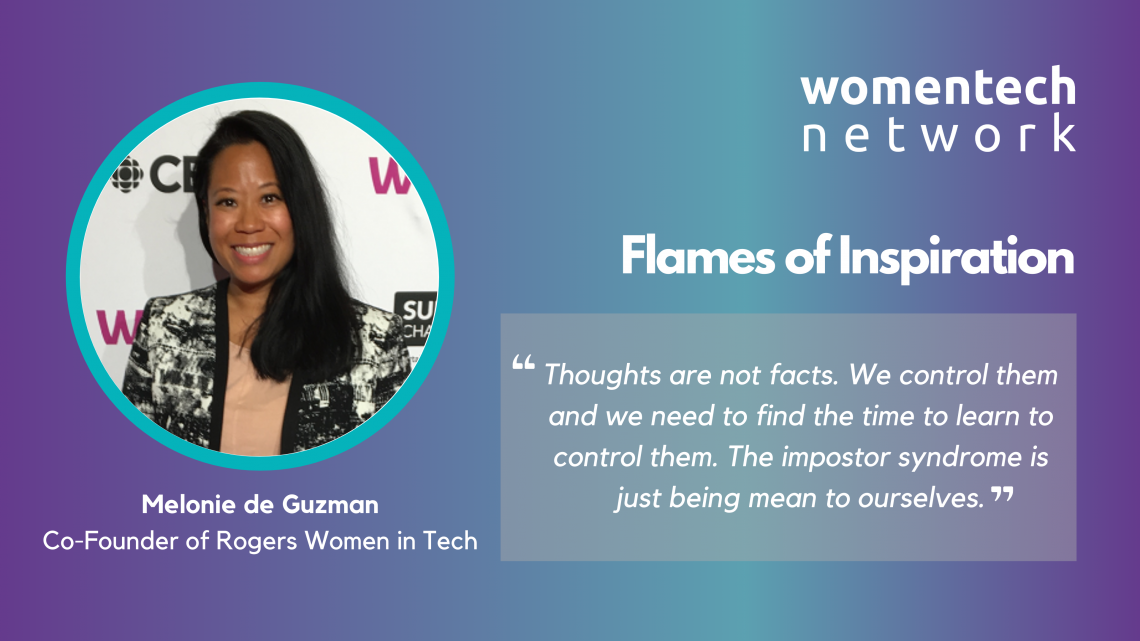
Melonie de Guzman is a digital media maven, working on high profile digital projects since 2005, before Twitter was even a thing. Today, she manages over 40 websites, 80 apps, and has spearheaded a Women in Technology association across Canada, Rogers Women In Tech.
About Rogers Women In Tech
In 2019, Melonie went to the Collision Conference in Toronto. They had women in tech booths, networking events, and panel discussions talking about the challenges women in tech face. Melonie recognized the opportunity to bring that energy to Rogers, a telecommunication and media company with a lot of tech departments, where she works as an Agile Project Manager. They did a lot of interviews and research, reaching out to other women in tech organizations.
“It funneled down to a few things. We talked about giving women the opportunity to upskill. We talked about giving back to the community by launching hackathons or introducing young girls in high school or elementary schools to the tech world. What we found was that even though Rogers was a big tech company, there are only one or two women per group at the table in each of our departments, and building that community makes them feel a bit less alone.“
One of the great initiatives that they were able to launch was mentorship circles. They launched 5 mentorship circles that consist of two executive leaders and 7-9 mentors all in tech departments. They meet monthly and create their own agenda. It happened right before lockdown, so the conversations focused on the challenges that work from home brought.
“One of the reasons why I am so passionate about mentorship is because when I look back at my career, I didn't see anyone who looked like me or could relate to my culture. I had to seek out mentors and coaches, organically. That’s recently in my career. So I was being a mentor, but looking for one as well. It’s been an eye-opening experience to see what support feels like.”
Project Management Skills As Tools In Personal Life
It took Melonie longer than needed to realize that her professional skills can be translated into her personal life, the most important project you work on. Once she realized that, it helped her change her perspective of how she accomplishes her goals. One important thing she does is to ask why she wants to achieve certain goals, whether it is because they align with her values or because she thinks she has to do them.
Another thing she learned was to create a plan for achieving each goal, not just put it in a “laundry list“ and try to do everything at once. Now, she tries to take each big goal and break it down in small, actionable steps.
An example: you want to live healthily, you decide to exercise. What will the exercise be though? Is running the best for your life or something else? Set the large goal, break it down, and then evaluate if it fits in your lifestyle.
How To Give Yourself Permission to Succeed
If you go back to how we were raised, we grow up doing the work and then get permission to move on. In school, for example, you do the work, you take a test, you get evaluated, and then you’re allowed to go to the next level.
“For so long, I had this mindset with me in my career. If I just do a great job, they’ll evaluate me and promote me. It took me long to realize there are other factors that impact my success. Your company has its own values, for example, its objectives and priorities, and they may not align with yours. That’s ok, the company has to focus on its bottom line. My advice is to not tie your success to your company and don’t wait for your CEO or VP to become the leader you want to be.”
For Melonie the “aha” moment took a while, around 14 years, to change her mentality, asking herself why is she still just a project manager. First, she was blaming herself. Then, she took a step back and did a matrix of her own career. She realized she was good enough. Your career growth, might not be a priority for the company, maybe because you’re great at your current position. Melonie wanted to build a community and be a mentor, so she realized that she has to stop waiting for her company to sponsor her and do it herself.
Is There a Way to Beat the Impostor Syndrome?
Everyone suffers from the impostor syndrome, not just women. It’s just that when women deal with it; they accept they’re feeling. A study found that when men feel it, they don’t want to feel that way. They tend to find a place where they feel like a big fish in a small pond.
“Thoughts are not facts. We control them and we need to find the time to learn to control them. The impostor syndrome is just being mean to ourselves. What you can do is giving permission to yourself and giving credit to yourself for the work that you’ve done. Make a list of your achievements so you have concrete data to remind yourself of your success.“
This is also called a hype list.
How Can We Empower Others To Speak Up?
“One of the reasons I love to do these talks is that I truly believe, especially when it comes to women in tech, the higher the volume we’re raising our voices together the more we empower each other. Viewing it as ‘you’re my competition’ isn’t the path for growth. Growing together is the path. There is enough for us to go around, so we should help each other out.“
Despite All Efforts, Why Are Women Still Underrepresented in STEM?
“I believe there is traction. I think platforms like WomenTech help. They’re really helping in raising the volume. We’re on the brink of people noticing that women in tech is a thing.”
Melonie’s observation is that when the STEM industry was built, women and minorities weren’t at the table. The way women communicate, network, and lead is different than men. The system is working as expected; it’s working to benefit the old-school way of things. When they were building this fictional table, women weren’t in the blueprints. For a long time, women and minorities have been waiting to be invited to the table, asking that permission or changing themselves to fit.
What is Harder: Advocating For Yourself or Other Women?
Both are hard according to Melonie, but advocating for others is harder in her opinion.
“Being an advocate for women in tech, that is a privilege and responsibility that I take seriously. If I am building a platform talking about other women in tech, I want to most holistic views. It’s also about having those difficult conversations. Sitting down with leadership and talk about unconscious biases is hard. They say they know that they need to be more inclusive, but they also think they deserve to be there, not making room for us.”
Another thing that makes it more difficult is making sure that the right people that need to learn are in the room, listening. Sometimes it feels we talk in the echo chamber. The information is not new to the people who listen.
Servant Leaders
Melonie talked about the type of leaders that can change mindsets and inclusivity in the workplace.
“It’s about how you approach leadership. The most effective leaders are the ones who are servants first: setting their team for success as opposed to gaining more power. Having those types of leaders more accepted, it will help shift the mindset and how we empower teams.”
Top Tips from Melonie
“The advice I would give myself is don’t tie your success to your company, don’t be afraid to change jobs to enrich your portfolio. That also reflects on advocating for yourself, because if you’re going for a job every three-four years, you need to let these people know who they are hiring. Keep your personal brand up to date.”
Melonie invited everyone to reach out to her on LinkedIn and share their personal stories and struggles.
“My LinkedIn door is always open.”
You can watch the full chat as part of our video library.
More upcoming Fireside Chats, find here.







